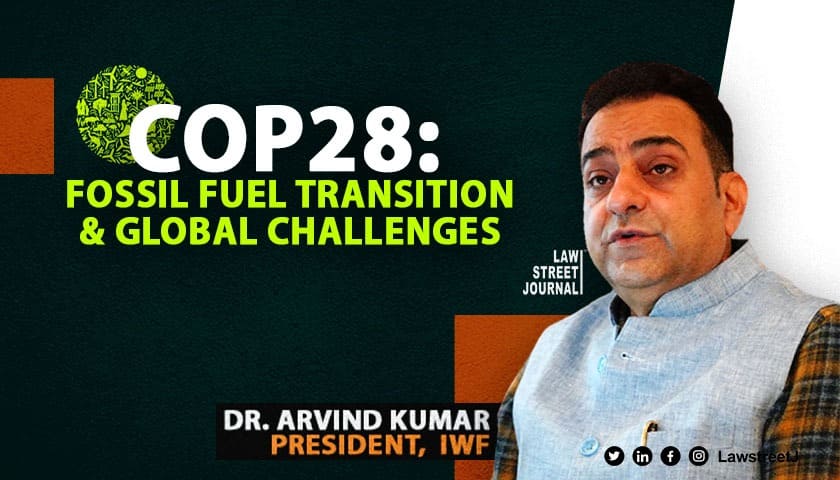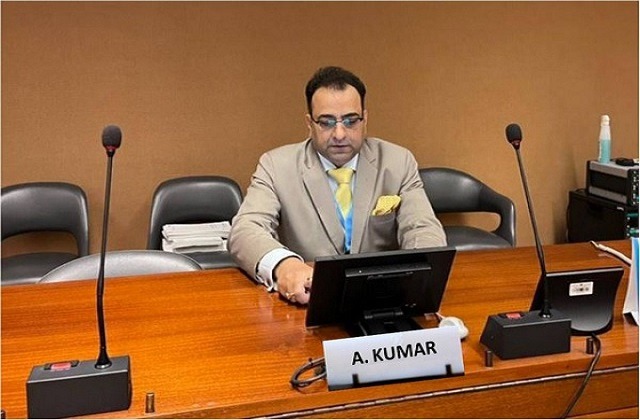In the past three decades, the United Nations has sponsored 28 annual climate summits. But that process has failed to provide a legally binding path to significant carbon emission reductions or to the phase out of fossil fuels responsible for the climate crisis. The just concluded COP28 summit, held in Dubai and largely controlled by fossil fuel interests, has pledged transitioning away from fossil fuels but that deal is also voluntary. Now, with the world on track for catastrophic global warming, litigation is increasingly being used to force governments to regulate fossil fuels and enforce existing laws. Thousands of climate-related lawsuits are underway to reduce emissions, stop drilling or gain compensation for the Indigenous and traditional peoples who are the most vulnerable to climate impacts. But despite some court wins for the environment, the litigation process is slow and unlikely to achieve major results in time to staunch fast-moving warming. Even when lawyers do win climate suits, there are no guarantees, governments or corporations will obey judicial decisions.
Other progress was also made in relation to adaptation and finance, including including the operationalization of the Loss and Damage Fund, even though financial commitments are very limited. The fund has been a long-standing demand of developing nations on the frontlines of climate change coping with the cost of the devastation caused by ever-increasing extreme weather events such as drought, floods, and rising seas. Following several years of intense negotiations at annual UN climate meetings, developed nations extended their support for the need to set up the fund last year during COP27 in Sharm el-Sheikh, Egypt.
Tougher Commitments and Historical Shift
The resolutions passed at COP28 marked a significant departure from the initial draft, sparking concern among delegates. Despite lacking legal binding, the agreements represent a groundbreaking moment in nearly three decades of UN climate summits. Notably, countries have collectively committed to a decisive move away from fossil fuels. While hailed as historic by COP president Sultan al-Jaber, there is disappointment among small island states, as the resolution emphasizes a transition away from fossil fuels rather than the more ambitious phase out or phase down proposed by frontline nations grappling with the immediate impacts of the climate crisis. COP28 set ambitious targets focused on renewable energy and energy efficiency. The global community aims to triple renewable energy capacity by 2030 while doubling the average annual rate of energy efficiency improvements. The resolution calls for a rapid reduction in unabated coal use and restricts the permitting of new coal power generation. Additionally, a commitment to accelerating efforts worldwide toward achieving net-zero emissions energy systems by mid-century is highlighted. The emphasis on a just, orderly, and equitable transition from fossil fuels aims to achieve net-zero emissions by 2050, aligning with scientific recommendations.
Sector-Specific Actions and Holistic Approaches
COP28 outlines a comprehensive approach to combating climate change by accelerating the adoption of zero and low-emission technologies. This includes renewables, nuclear power, carbon capture and utilization, storage technologies, and low-carbon hydrogen production. Efforts to substantially reduce non-CO2 emissions globally, particularly methane, are prioritized by 2030. The resolution also addresses emissions from road transport, promoting infrastructure development and rapid deployment of zero-emission vehicles. Furthermore, COP28 calls for the phased-out removal of inefficient fossil fuel subsidies that fail to address energy poverty or support just transitions, emphasizing a need for immediate action.
Some major agreements and commitments reached are-
- The loss and damage fund designed to support climate-vulnerable developing countries was brought to life on the first day of the COP. Countries have pledged hundreds of millions of dollars so far for the fund;
- Commitments of worth $3.5 billion to replenish the resources of the Green Climate Fund;
- New announcements totaling over $150 million for the Least Developed Countries Fund (LDC) and Special Climate Change Fund (SCCF)
- An increase of $9 billion annually by the World Bank to finance climate-related projects (2024 and 2025);
- Nearly 120 countries backed COP28 UAE Climate and Health Declaration to accelerate actions to protect peoples health from growing climate impacts;
- Over 130 countries have signed up to COP28 UAE Declaration on Agriculture, Food, and Climate to support food security while combating climate change; and
- Global Cooling Pledge has been endorsed by 66 countries to reduce cooling related emissions by 68% from today.
Takeaways and throwbacks for India at COP28
India-led Global River Cities Alliance (GRCA) launched which is an ambitious initiative and aims to leverage the collective power of river cities worldwide to address shared challenges and promote sustainable river management practices. The GRCA is currently made up of India, Egypt, Netherlands, Denmark, Ghana, Australia, Bhutan, Cambodia, Japan, and river-cities of The Hague (Den Haag) from the Netherlands, Adelaide from Australia, and Szolnok of Hungary. The adoption of an agreement for a new Loss and Damage Fund will provide financial assistance to vulnerable countries, including India, who are already experiencing the devastating impacts of climate change, such as rising sea levels, extreme weather events, and mass displacement. While India has done better than many, especially given its large population, it has not broadened the scope to tackle climate change at a regional level across South Asia, one of the worlds most climate vulnerable areas- and this is where it needs more focus.
Indias latest submission to the UNFCCC showed that it spent a staggering Rs 13.35 lakh crore in 2021-22 towards climate adaptation measures, representing just over 5.5 percent of its GDP. It also plans to invest an additional Rs 57 lakh crore over the next seven years, highlighting its long-term commitment to adaptation. This bold move places India among the leading nations in terms of climate adaptation funding, setting a strong example for other countries.
India didnt sign the Global Renewables and Energy Efficiency Pledge that aims to triple global renewable energy capacity and double the rate of energy efficiency by 2030. The pledge seeks to triple global installed renewable energy capacity to at least 11,000GW and double the global energy efficiency improvement rate to more than 4% by 2030.India also refused to sign the COP28 Declaration on Climate and Health because of the lack of practicality in curbing greenhouse gases use for cooling in the health sector. India expressed concerns that greenhouse gas reduction for cooling in the health sector could hinder its ability to meet the growing demands for medical services, particularly in remote and underserved areas.
Way Ahead
The next round of national climate action plans or Nationally Determined Contributions is due in 2025, when countries are expected to have seriously boosted their actions and commitments. Azerbaijan was announced as the official host COP29 from November 11 to 22 next year. It doesnt need 77,000 delegates to fly to a conference in West Asia to study whether the world is on track with the goals they established at the CoP 21 in Paris in 2016- it should be fairly clear that the world has failed to ensure goals on mitigation of greenhouse gases, keeping global warming in check and on climate change adaptation. After decades of evasion, COP28 finally cast a glaring spotlight on the real culprits of the climate crisis: fossil fuels. A long-overdue direction to move away from coal, oil, and gas has been set. But the outcome was "marred by loopholes that offer the fossil fuel industry numerous escape routes, relying on unproven, unsafe technologies.
Developing countries still dependent on fossil fuels are left without robust guarantees for adequate financial support in their urgent and equitable transition to renewable energy. While this COP recognized the immense financial shortfall in tackling climate impacts, the final outcomes fall disappointingly short of compelling wealthy nations to fulfill their financial responsibilities. The post-COP28 reality is that despite this looming threat and indeed, adverse climate events that are getting ever more frequent nothing in the agreement suggests the end of fossil fuels is near. While the meet did yield numerous and worthwhile pledges the one big takeaway is that fossil fuels are going to be the mainstay of economies everywhere in the years to come.
About Author
Dr. Arvind Kumar
President and Founder, India Water Foundation
Dr. Arvind Kumar is President and Founder of India Water Foundation a non-profit organization and think tank, Former Governor, World Water Council. He is a strategist and key-influencer in development sector with more than 28 years of experience, author, columnist, Water and Human Rights Pro-activist, and specializes in ecosystem-based adaptation, water-energy-food nexus, with specific emphasis on Transversality approach of inter-linkages between water, environment and SDGs. He has published over 500+ research articles and is a Ph.D. Defense Studies. He jointly edited a publication with SAC Dhaka titled SAARC Outlook on Water-Energy-Food Nexus in SAARC Region. Author of United Nations: 75 and beyond to commemorate 75 years of service of UN, 'Ecosystem Based Adaptation' published by Elsevier London and 'India @75 and Beyond'.
He is former member of the National Wetlands Committee, MoEF&CC, GOI, member Technical Advisory Committee for India's Third National Communication and Biennial Update Reports to UNFCCC, member of the Meghalaya State Water Resources Council and Meghalaya council for Climate Change and Sustainable Development, Member of the General Body of CAPART, Member Working Group on Water Resources Development, Management and Efficient utilization to seek inputs for development agenda for New India @75, NITI Aayog, GOI.
Conferred with the Achievers Award for his exemplary contribution and commitment for protecting environment by India Eye IHRO in collaboration with UNIC for India & Bhutan on the occasion of World Environment Day 2017 in New Delhi, Water Digest Water Awards Water Warriors - United for Water! 2017-18 under the Category BEST WATER NGO - WATER EDUCATION. http://drarvindkumar.org/









